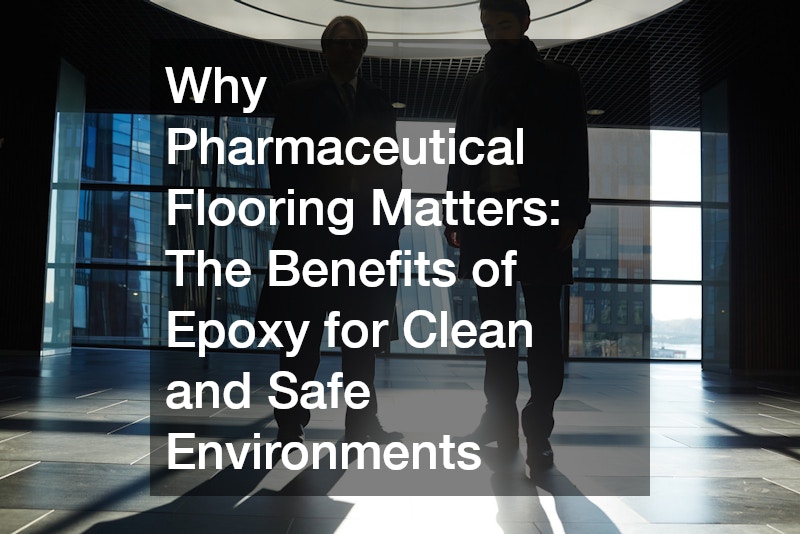In environments where cleanliness and safety are paramount, such as pharmaceutical facilities, the flooring choice plays a crucial role. Pharmaceutical flooring must meet rigorous standards to support a sterile, efficient, and safe working environment. Among the various flooring options available, epoxy emerges as a top choice due to its unique properties that address the specific needs of these high-demand settings.
1. Durability and Longevity
Pharmaceutical environments are subjected to heavy traffic, frequent cleaning, and exposure to various substances. Epoxy flooring is renowned for its durability, making it an ideal solution for these demanding conditions.
The epoxy resin used in the flooring creates a tough, long-lasting surface that can withstand the daily wear and tear typical in pharmaceutical settings. This resilience ensures that the flooring maintains its integrity over time, reducing the need for frequent repairs or replacements.
2. Chemical Resistance
In pharmaceutical facilities, exposure to chemicals is common, from cleaning agents to various substances used in the manufacturing process. Epoxy flooring stands out for its exceptional resistance to chemical spills and stains. This resistance is crucial in maintaining the integrity of the flooring and ensuring that it continues to provide a safe and clean surface. Unlike many other flooring options, epoxy does not easily deteriorate when exposed to harsh chemicals, making it a reliable choice for environments where chemical handling is routine.
3. Non-Porous Surface
One of the most significant advantages of epoxy flooring in pharmaceutical settings is its non-porous nature. Unlike porous flooring materials, epoxy does not absorb liquids or contaminants. This characteristic is vital for maintaining a hygienic environment as it prevents the growth and accumulation of bacteria, mold, and other microbes. A non-porous surface ensures that spills and cleaning agents remain on the surface, making the cleaning process more efficient and thorough.
4. Ease of Cleaning
Maintaining cleanliness is a critical aspect of pharmaceutical operations, and the flooring plays a significant role in this effort. Epoxy floors are incredibly easy to clean due to their smooth, non-porous surface. Regular cleaning becomes more manageable as dirt, dust, and spills can be swiftly wiped away without leaving residues. This ease of maintenance helps ensure that the facility remains compliant with cleanliness standards and reduces the overall time and effort required for floor upkeep.
5. Safety Considerations
Safety is a top priority in any pharmaceutical facility, and flooring can impact safety in several ways. Epoxy flooring can be customized to include slip-resistant additives, reducing the risk of slips and falls in areas prone to spills or high moisture. Additionally, the seamless nature of epoxy flooring eliminates the presence of joints or seams where dirt and contaminants could accumulate. This seamless finish not only enhances cleanliness but also minimizes tripping hazards, contributing to a safer working environment.
6. Aesthetic Flexibility
While functionality is paramount, aesthetic considerations also play a role in creating a pleasant working environment. Epoxy flooring offers a range of design options and finishes, allowing facilities to achieve a professional and clean appearance. The versatility in colors and patterns can enhance the overall look of the facility while maintaining the practical benefits of epoxy flooring.
7. Regulatory Compliance
Pharmaceutical facilities are subject to strict regulations and standards to ensure product safety and quality. Epoxy flooring helps facilities comply with these regulations by providing a surface that meets industry requirements for cleanliness and safety. The non-porous and chemically resistant properties of epoxy flooring align with regulatory expectations, supporting the facility’s efforts to maintain high standards.
8. Cost-Effectiveness
Although the initial investment in epoxy flooring may be higher than other options, its long-term benefits offer cost-effectiveness. The durability and low maintenance requirements of epoxy flooring contribute to lower overall lifecycle costs. Fewer repairs, less frequent replacements, and reduced cleaning efforts translate into financial savings over time, making epoxy a wise investment for pharmaceutical facilities.
9. Environmental Considerations
In today’s environmentally conscious world, the sustainability of building materials is increasingly important. Epoxy flooring can be environmentally friendly when selected with sustainability in mind. Many epoxy formulations are low in volatile organic compounds (VOCs), contributing to better indoor air quality. Additionally, the longevity of epoxy flooring reduces the frequency of replacements, minimizing waste and the environmental impact associated with flooring materials.
Conclusion
The choice of flooring in pharmaceutical environments is more than just a matter of aesthetics; it directly impacts cleanliness, safety, and operational efficiency. Epoxy flooring is an optimal choice for pharmaceutical facilities due to its durability, chemical resistance, non-porous surface, and ease of maintenance. By investing in high-quality pharmaceutical flooring, facilities can ensure a safe, clean, and efficient environment that supports critical operations and meets stringent industry standards.
.


